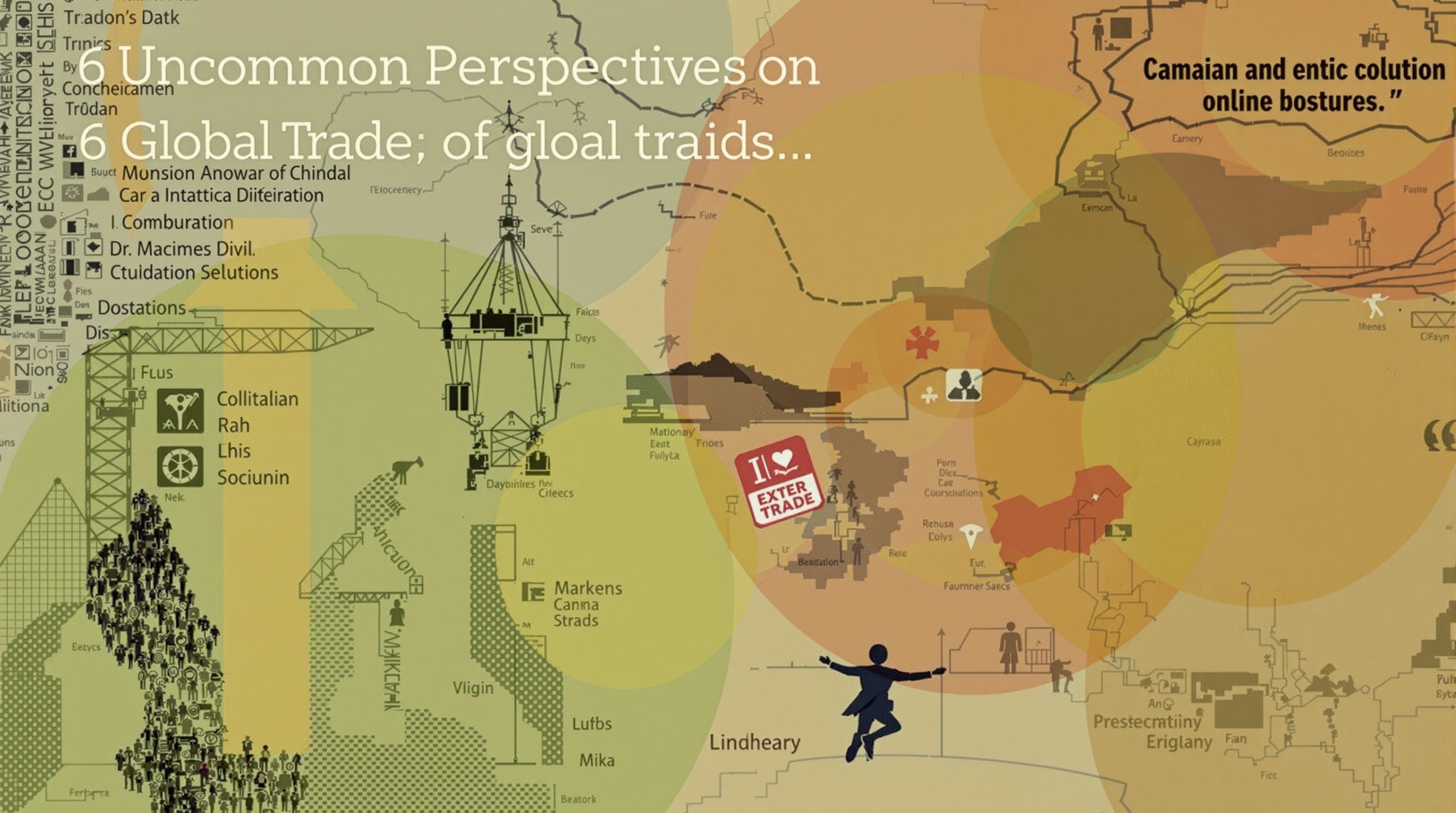Related Articles
- When Ancient Trade Routes Resurface: Unexpected Lessons for Modern Commerce and Global Economic Resilience
- When Artifacts Become Currencies: The Intriguing Trade Between Antiquities and Emerging Markets
- Beyond Borders: Unconventional Partnerships Transforming Trade Strategies in the Age of Globalization
- The Rise of Shadow Economies: How Informal Trade Networks are Disrupting Global Market Structures
- Cryptocurrency and Society: Understanding the Hidden Costs of Digital Assets on Community Well-Being
- The Surprising Role of Cultural Narratives in Shaping Investment Choices and Financial Preferences
Beyond Borders: Unconventional Partnerships Transforming Trade Strategies in the Age of Globalization
Beyond Borders: Unconventional Partnerships Transforming Trade Strategies in the Age of Globalization
In the face of rapidly evolving global dynamics, unconventional partnerships are revolutionizing trade strategies, paving the way for innovative practices beyond borders. This article explores how collaboration—often unexpected—between diverse nations and industries is driving growth and reshaping traditional trade methods in today's globalized economy.
Introduction: A New Era of Global Trade
Globalization is not just a buzzword; it’s a seismic shift in the way nations interact, trade, and collaborate. Yet, as traditional trade routes and practices face unprecedented challenges—think trade wars, tariffs, and shifting economic powers—new, unconventional partnerships are emerging, enabling countries and businesses to adapt and thrive in this digital age.
The Power of Collaboration
If you think about it, the very idea of going it alone seems almost archaic. Businesses and countries alike are discovering that collaboration often leads to innovation—a lesson that’s especially impactful within trade strategies. According to a 2021 report by the World Economic Forum, over 50% of companies now rely on partnerships as a core component of their growth strategy, up from just 38% a decade ago. This indicates a significant shift in mindset and operational tactics as we move deeper into the 21st century.
Case Study: The Rise of Digital Platforms
Take, for example, the rise of digital trade platforms such as Alibaba and Amazon. These companies have ushered international small and medium-sized enterprises (SMEs) into the global marketplace, offering them tools and resources once reserved for larger corporations. In 2022 alone, Alibaba reported more than $30 billion in gross merchandise volume from its cross-border e-commerce division, showcasing the immense potential of digital trade.
In terms of conventional partnerships, consider the collaboration between local artisans and global e-commerce platforms. Many artisans gain access to international markets through these platforms, alongside support in marketing and logistics, allowing them to compete fairly on a global scale.
Humor in Trade? A Light-Hearted Perspective
Now, if you think trade talks are all serious business, let’s sprinkle in some humor! Imagine negotiating trade with a country known for its pastries, like France. "Could we perhaps swap some fine wine for your delightful croissants?" It’s essential to remember that behind intricate agreements and trade strategies, a touch of humanity—and yes, even humor—can bridge gaps and foster understanding. After all, wouldn’t you rather discuss trade over a slice of moist cake than in a sterile boardroom?
Unlikely Partnerships: Surprising Alliances from Across the Globe
Unconventional partnerships are not solely limited to businesses. Countries are finding unique allies; for instance, post-Brexit, the UK has turned to its historic colonies in the Caribbean and Africa as new trading partners, significantly shifting its traditional trade dynamics. Notably, the UK made significant strides with the Caribbean Community (CARICOM) nations through the UK-Caribbean Trade Agreement, fostering economic links that were once underexplored. This intercontinental camaraderie showcases a fresh paradigm in trade relations.
Statistics that Matter: Trade by the Numbers
Let’s get down to the numbers. According to the International Monetary Fund (IMF), global trade volume is projected to rise by 5% annually, reaching about $25 trillion by 2025. What does this mean for you? It’s a bustling marketplace filled with opportunities for innovation and collaboration, challenging the status quo time and again. Additionally, Deloitte’s report suggests that over 90% of CEOs believe collaboration will drive the next wave of growth.
The Role of Technology
But what binds these unconventional partnerships in the modern age? Technology stands at the forefront. Cloud computing, big data, and artificial intelligence enable businesses to share insights and resources seamlessly. A prime example can be seen with France's partnership with Japan to develop "smart ports"—integrated systems allowing for more efficient logistics and real-time data sharing, significantly improving the shipment processes between the two nations.
Storytelling: The Tale of a Small Village
Let me tell you a story. Picture a small village in Kenya, where local artisans craft beautiful beadwork. Many of these artists have encountered obstacles in selling their work globally. However, through an unconventional partnership with a tech startup, they’ve launched an online storefront. Overnight, the world discovered these creations. Sales quintupled in just one year, thanks to a willingness to embrace innovative strategies and form unexpected alliances.
This story exemplifies the shift in traditional trade paradigms—by leveraging digital platforms, previously marginalized artisans are finally receiving the recognition and revenue they deserve.
Environmental Impact: Partnerships for Sustainability
In a world facing climate change, unconventional partnerships are now being forged to promote sustainable trade practices. For example, the collaboration between Scandinavian countries and Southeast Asian nations showcases a unique model of sustainable timber trading. By working together, these nations strive to ensure that timber is sourced responsibly, addressing deforestation while promoting economic growth. Sustainable partnerships like these represent a win-win strategy—protecting the environment while enabling trade.
Education: The Foundation of Success
Yet it doesn’t stop there. Education plays a vital role in transforming trade strategies. Non-profits and educational institutions are increasingly collaborating with businesses to foster a workforce equipped with the skills needed to navigate 21st-century trade challenges. From workshops on digital marketing to trainings on international regulations, these educational partnerships ensure that upcoming generations are well-prepared for the global marketplace. Research has shown that companies investing in educational programs report a 20% increase in productivity. Who wouldn’t want that kind of return on investment?
Conclusion: A Future Unwritten
As we gaze into the future of globalization, the landscape remains unpredictable. However, through unconventional partnerships—whether they span across industries or countries—the potential for innovative trade strategies continues to blossom. In doing so, we will witness a transformation not just in how trade occurs, but also in how nations relate to one another. It’s an exciting time to be engaged in global trade, with endless possibilities limited only by our imaginations. Who knows? In the realm of trade, the next revolutionary idea may arise at a local coffee shop, from the partnership of two people passionate about creating change.
So, whether you’re an aspiring entrepreneur, a curious teenager, or an experienced business leader, embracing this era of partnership can lead to lasting change. Join hands, think outside the box, and together let’s navigate these uncharted territories of trade!





